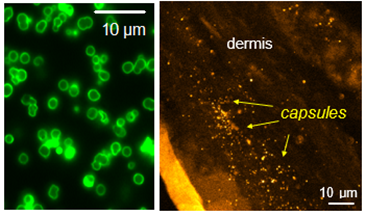In this interview as part of the Early Career Innovators series, recognising the amazing translational work being done by postdocs and non-tenured researchers at University College London (UCL), Dr Olga Kopach highlights her Regenerative Medicine Therapeutic Innovation Network (TIN) Pilot Data Fund awarded project, investigating the therapeutic potential of medicine encapsulation for treating chronic pain and nerve regeneration.
What is the title of your project and what does it involve?
The Regenerative Medicine TIN Pilot Data Scheme has supported my project entitled “Therapeutic potential of medicine encapsulation for the treatment of chronic pain and nerve regeneration”. It aims to explore the potential of drug encapsulation using nanotechnology in the treatment of chronic pain. Chronic or persistent pain of different origins (for example, after injury or trauma, post-operation, neuropathic/diabetic pain, cancer and others) is a major healthcare problem worldwide; statistically, it overcomes many common diseases and has been recently classified as a disease in its own right, thus requiring special treatment.
The project will answer whether:
- Nanoengineered microcapsules are capable of retaining medicine and providing a prolonged release of that medicine within the targeted area.
- An encapsulation approach can prove more effective than existing methods of pain treatment, such as local injections of an analgesic of choice.
- Microencapsulation of medicine can advance the treatment of inflammatory pain without side-effects.
What is the motivation behind your project/therapeutic?
In practice, common treatments of pain rely on either repeated local injections of painkillers (for example, lidocaine) or systemic administration of drugs, such as opiates, which produce numerous side-effects. This project will implement a multi-disciplinary approach, by combining nanochemistry/nanoengineering and biomedical research to develop a new therapeutic approach for targeted nerve treatment. Considering our previous findings on the benefits of using encapsulated drugs injected into peripheral tissue, this project will establish a new approach that will be better suited against persistent pain of various origins.

Nanoengineered microcapsules. Skin section with scattered microcapsules (Kopach et al., Drug Deliv. 2018 Nov;25(1):435-447.)
Can you highlight any challenges have you experienced as an early career researcher in the regenerative medicine/translational research space?
For an early career researcher, obtaining funding to perform independent research is always challenging – it requires not only a large body of preliminary results, but also strong support from a Principle Investigator (PI) and a hosting laboratory to be able to establish a research network and collaborations without having a permanent position. Even more challenging is developing connections with industry – a logical, coherent step for the translational pathway of a developed product. As an early career researcher, I met some difficulties and limitations while trying to find funding for my own ideas and future independent projects through grant applications.
Why did you want to apply to the Regenerative Medicine TIN Pilot Data Fund? How has it helped you?
The Regenerative Medicine TIN Pilot Data Fund is the ideally suited scheme for early career researchers who seek funding to generate pilot data. I also applied to this scheme to be able to get started in a slightly adventurous direction (peripheral nerve regeneration), the research field that is often considered to be highly risky to start with. This award has provided me with a perfect opportunity to pursue my research in a more translational pathway and to progress my research career towards that direction. The obtained preliminary data will be a core and, hopefully, a high-gain part of my fellowship applications and career progress.
How did you find the process for the TIN Pilot Data Fund? What did you learn?
The process was very straightforward as the application form was short, with only a brief outline required across its sections. After being shortlisted for a pitching event, a professional coach was offered through ACCELERATE training, which I found extremely useful. I received very helpful feedback and learned how to effectively deliver my ideas in a concise style to best fit a presentation of the project in just 2 minutes.
What do you hope to achieve in the 6 months duration of your project?
Thanks to this opportunity and support from Regenerative Medicine TIN, I hope to collect a set of interesting and promising pilot data, which will help to achieve more funding in the future. I am excited to probe a new direction of implementing drug encapsulation into new, clinically relevant, avenues in neurology and to achieve some potential benefits for in vivo applications. I am looking forward to making this the backbone of my future fellowship applications and, in perspective, finding the translational direction for this approach as a breakthrough strategy. I obtained useful experience in managing key research objectives and milestones for the short, 6-month, duration of the project and have currently begun establishing animal models.

About Dr Olga Kopach
Dr Olga Kopach is a postdoctoral research fellow working in Prof. Dmitri Rusakov`s laboratory within the Department of Clinical and Experimental Epilepsy, UCL Queen Square Institute of Neurology. After obtaining PhD degree in Physiology, Olga started her postdoctoral research in the field of pain, studying the central mechanisms of persistent pain development and maintenance. She has worked in pain research for 15 years, probing various strategies, pharmacological and genetic, for curing chronic pain.
Throughout her postdoctoral work at UCL, Olga also studied synaptic plasticity in the brain, working on more basic neuroscience projects that investigated neuronal and astroglial cell function in brain tissue.
Olga continues her research in neuroscience, focusing on innovative drug delivery technologies, with a great interest in establishing new routes to advance targeted nerve treatment in neurology.
 Close
Close




